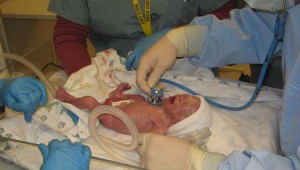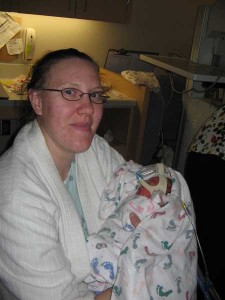Tips for Life After the NICU (Although We Hope You Never Have to Use Them): Part 2
This week on Fit Bottomed Mamas, we’re raising awareness of postpartum depression. In this two-part series, reader Kim O. shared with us her experience with a premature infant and her tips for parents of NICU babies. Today, she shares more tips on life before and after a NICU stay and how she survived post-traumatic stress disorder.
Wow…Getting used to life at home was really difficult for me. I had a really nice routine going when my son was in the hospital. Now I was back to taking care of my husband, my two dogs and my son, and I really went to the back burner…
Finally, we got into a routine. I went back to work, and my son came with me (I work in a daycare). Then I started having flashbacks of my son’s birth and his NICU stay. I would try talking to people about it. NOBODY “got” how I was feeling, even my husband. His thought was that “He’s home, he’s okay, and everything’s fine.” But it wasn’t FINE.
I made an appointment with my doctor, and I was diagnosed with Post Traumatic Stress Disorder (PTSD). Almost a year after being released from the NICU, I am just now really hearing about others going through PTSD after a NICU experience. I would have to say this is the hardest part. I will be completely honest: it sucks! There are still people who don’t understand and judge. Only you will know if you need help. Please get help if you need it! You deserve it, and your child deserves the best mommy he/she can get! Talk to others who have been through similar experiences; there are several support groups online. They all “get it” and are there for love and support.

Kim’s son, getting ready for his long NICU stay.
More Tips for NICU Survival
- Don’t let the situations consume you. (Easier said than done!)
- Let go of any guilty feelings.
- Be sure to make time for the rest of your family.
- Get involved in your baby’s care; do everything you can while you are with you baby.
- Don’t be afraid. The nurse is your support and teacher.
- Watch and ask questions.
- Call as often as you need to. The nurse might not have time to talk, but reassurance is everything.
- Talk with each of the nurses to help them learn more about you and your baby.
- Don’t be afraid to make suggestions and talk openly with nurses about ideas you have for you and your baby.
- Stay on schedule for visits. It helps you, your baby, and the nurses make your time together the best and most productive.
- The biggest hurdle is not feeling guilty when you leave each day!
- Don’t worry about the monitors. Focus on your baby, not the alarms.
- Decorate with a few small things from home.
- Go out to dinner at least once before your baby comes home.
- Arrive 15 minutes before feeding or care time.
- Let your baby get deep, uninterrupted sleep between feeding and care. Bond on the baby’s schedule, not yours!
Great tips, Kim. We’re so glad you got the help you needed and are helping us spread the word about PTSD and depression! —Erin


